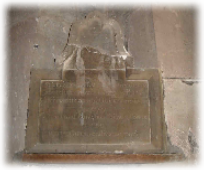FRIENDS OF CLAINES CHuRCH
As I remember to have read this piquant effusion in my youth, a long time ago, and as Richard Stephens did not give up the ghost till 1831, it is more than probable that in this, the last act of his life, he was guilty of literary piracy; a crime one can afford to forgive in a blacksmith;—may he be safe from the enraged shade of the poor author he defrauded! The churchyard seems to be very full of bodies. I suppose it has been the burial-
The stoves were crackling and burning brightly and the sunbeams were streaming through the windows, the seat-
"Look down the middle aisle. It is filled with common people—with God's commonest earth: farming men, labourers, artizans; the dredges of the world, who are nevertheless told by the good man in the pulpit that they have—every one— within them, an immortal angel. They are assured that all wealth is vanity; they are directed to look upon pride and arrogance as deadly sins; and with these lovely precepts touching their heartstrings, they look on each side and see the ladies and gentlemen—called by the clergyman their fellow-
The services were performed by the perpetual curate in a solemn and deliberate manner; the singing was tolerably well-
"When such a she priest comes her mass to say,
Twenty to one they all forget to pray."
Claines church, it seems, is a favourite spot—a sort of "St. George's, Hanover-
After hearing an admirable, christian-
The bulk of the great tithes of this parish formerly belonged to St. Wulstan's Hospital, but Henry VIII appropriated them to Christ Church, Oxford. The monastery of the White Ladies originally received the small tithes, and the priest of St. Swithin's, in this city, also received certain of them, as ghostly father of the nuns. The minister of St. Swithin's, I believe, still continues to receive this emolument, although, of course, his "ghostly fathership" has been for many years a sinecure. As a portion of the income of the sisterhood was formerly devoted to the repairs of the chancel of Claines Church, I cannot, therefore, help thinking that, as that institution is now suppressed, the proceeds of the " ghostly fathership" should be applied in the aforesaid repairs; or it may very usefully form an addition to the income of the perpetual curate of Claines, and would thus fulfil a far more legitimate purpose than that of enriching a clergyman who has nothing to do with the parish; for I understand that the whole stated income of the present curate of Claines is but 27l. derived from the lay impropriator, augmented by a grant from Queen Anne's bounty, which was laid out in the purchase of land, added to his surplus fees, &c., which perhaps raise the whole to 180l.—a small sum indeed for a perpetual curacy in so extensive a parish, where I believe that the benevolence of the clergyman results in the distribution of a large portion of his income for charitable purposes. Latimer, in speaking of the clergy, says—"They have great labours, and therefore they ought to have good livings, that they may commodiously feed their flocks; for the preaching of the word of God unto the people is called meat. Scripture calleth it meat, not strawberries, that come but once a yeare, and tarry not long, but are soone gone; but it is meat and no dainties. The people must have meat that must be familiar and continuall, and daily given unto them to feed upon. Many make a strawberry of it, ministring it but once a yeare, but such do not the office of good prelates. For Christ saith: Quis putas est servus prudens et fidelis, qui dat cibum in tempore. Who think ye is a wise and faithful servant? he that giveth meat in due time so that he must at all times convenient search diligently.''
The parish of Claines was originally a chapelry to St. Helen's, in this city; it was divided into several hamlets or tythings, including the ancient manor of Northwick, and the church was called the church of Northwick, though situated in the hamlet of Claines. In 1218 Claines became a separate parish. It appears that the late Sir H. Wakeman bought the advowson of this benefice of Christ Church College, pending a suit then in the exchequer, and the issue of which was so successful that the baronet is presumed to have made a " nice thing of it." I hope some day to be enabled to attack, if not diminish, this monstrous evil of lay patronage and lay money-
There are said to be, near the church, existing traces of the foundation of an old parsonage-
I am happy to hear that the allotment system and provident clubs are in useful operation in this parish, under the care of Mr. Curtlet, Mr. Gutch, and Mr. Palmer, the perpetual curate, whose exertions in ameliorating the condition of the pour, and educating their children, are well backed and supported by two or three active and benevolent ladies. The plan of allotments in particular works well; the rentals being punctually paid. One of the regulations enjoins on the tenants the necessity of attending some place of divine worship. There are upwards of thirty allotments. I have been informed, though I am reluctant to believe it, that the two principal landowners in the parish not only give no assistance to the benevolent scheme, but that—what makes the matter truly unintelligible—one of these gentlemen occasionally presides at the meetings of the committee; and urges, as an excuse, that he cannot let them any of his land without offending the farmers! A pretty specimen, forsooth, of independence and liberality combined!
Among the charitable donations left from time to time in this parish are the following:—Edward Thomas, gent., 1656, left, £50 to remain as stock for ever, to place out poor children as apprentices; and in connection with his gift, I should think it is a singular instance, unprecedented in any other part of the kingdom, that there is now in hand a large sum of this stock unapplied, for lack of candidates. I am informed, however, that this is not attributable to a want of publicity, as the matter has been advertised. In a large parish like Claines, one would think there were hundreds of poor children whose parents would be delighted with such an opportunity of benefiting them. I hope this will answer the purpose of an advertisement to such persons. For myself having accidentally heard of this state of things, I shall not fail to stop every poor person I may henceforth happen to meet in the street, and if they chance to have children answering the description required, post them off immediately to the churchwardens of Claines, to whom I wish much joy for their extra labours during the next three months. Among the remaining charities are—Mr. Charles Evans, , £10; interest to be given to old bachelors and maids on St. John's day; and the rev. T. Cooke £21, interest to purchase gowns and coats for poor men and women, to be marked.
C.
T. M.
The reflecting mind revolts at this unfeeling attempt to level poverty with crime, by putting on a badge approximating to that (the only one that can be excused) of the
R.V.
on the county rogues and vagabonds. The offence to my feelings is still greater from the fact of the donor having made such unworthiness the means of perpetuating his initials to posterity;—and from a clergyman, too, whose sacred profession should have taught him to remember—
"Who builds a church to God and not to fame,
Will never mark the marble with his name."
The intention of the donor, however, is frustrated, inasmuch as the initials have long ceased to be attached to the garments. But I must here pause, and close my notice of the parish of Claines—a locality which has on the whole afforded me, in my brief rambling, far more of pain than pleasure. In my next paper I shall take the reader to the neighbourhood of royalty.— Worcestershire Chronicle.
STRAY NOTES ON THE CHURCHES AND CHURCH GOERS OF
WORCESTERSHIRE.
BY A RAMBLER.
from:
THE MIRROR
of
Literature, Amusement, and Instruction
(Price Twopence)
No 2, Saturday, January 10 1846 (Vol 1, 1846)
claines.—It was on a bright alluring morning in the month of December that I resolved on making a pilgrimage to this retired and favourite village, and with that intention, having donned my winter coat and thick-
Thus change they; and we change as well,
The heartfelt glow, the joyous swell
Of spirits ever pay, Pass on, nor leave a trace behind,
Like summer's perfume on the wind,
Save one last, lonely ray.
Spring will return to earth."
On approaching the church from the fields, no one would suspect the existence of an ecclesiastical edifice, the site being so flanked and defended by trees. The building wears a piecemeal appearance, as though it had been formed by the junction of three or four old houses.
The original portions of the building are somewhat ancient, bearing traces of both the Tudor and perpendicular styles, here and there disguised by the alterations and repairs of more modern architects, the bulk of these alterations (including a handsome new porch) having been effected some three or four years ago. The porch is decorated with small stained glass windows; and a poor box is there fixed, which by its bright and clean appearance puts a negative upon the facetious satire I have somewhere heard—namely, that charity boxes are the safest sanctuary for the spider to take shelter in to avoid intrusion. The interior of the church consists of a nave, chancel, and side aisles, formed by two rows of pillars and arches. The east window is of modern stained glass, bearing the royal and episcopal arms; at the west end is a gallery with an organ of tolerably good tone and quality, and small galleries over the north and south aisles are among the latest improvements. The organ was presented by the late Sir H. Wakeman, but there is no available fund out of which to repair it or to pay the organist, who, therefore, together with a female singer (the only paid one), is remunerated by subscription.
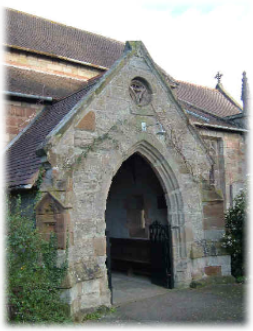
The “new” porch
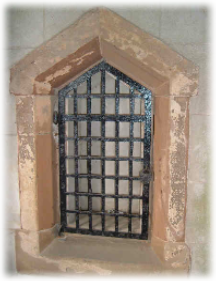
The poor box
I observed no monumental remains worthy of note in the interior; near the north window of the chancel aisle once lay the stone figure of John Porter, who formerly occupied and gave the name to "Porter's Mills,'' in this parish; this effigy is now removed to the outside, and instead of being on its back is placed on its side, and besides this, is robbed of a leg and hands; the carving is good, especially of the cap. The inscription conveys a most equivocal compliment—"John Porter, which was a lawyer, 1577.” Perhaps it may have been the fact of Mr. Porter being a lawyer that induced the authorities to turn his effigy out of the church, during the progress of certain repairs, and to make him do penance by lying on his side under the drippings of the roof; the gentleman however seemed to have been almost prophetic on this very point while writing the epitaph which was formerly placed over the figure, for the first line of the couplet selected was—
" Omnia transibunt—nos ibimus, ibitis, ibunt."
For my own part I do not believe that Mr Porter or any one else would have sustained much disadvantage by burial in the grave-
"Pile not the marble
Upon me when dead,
The wide vault of heaven
Alone be o'erspread;
Where the rain wets the turf
Be my narrow house made—
Where the passenger walks
Let my ashes be laid”
In the churchyard, near the principal north entrance, is a fine specimen of antiquae reliquaiae, in the parish stocks; it is presided over by a still greater piece of antiquity, namely, a very venerable but now decaying yew, apparently six or seven centuries old. The position of the stocks being about midway between the church and the alehouse which stands in the yard, is, I dare say, meant as an admonition to the rustics, and intended to "give them pause" in passing from the one to the other, to beware lest they "put their foot in it." As however this machine appears to be never brought into requisition (the Sunday wakes being almost suppressed here), I would advise the authorities to bargain for the sale of it to the Worcester bench of magistrates, who now, for the lack of such an hold-
A new stone font stands at the west end of the church; but there is a basin on a pedestal standing by the northwest pillar of the chancel. In this same pillar is an ancient piscina (or recess used by the officiating priests, wherein to wash their hands when engaged in the services); it is probably as ancient as 9 Henry V, when Helena and John Frogmore gave two parcels of land in Northwick for the maintenance in Claines church of a chantry to the Virgin.
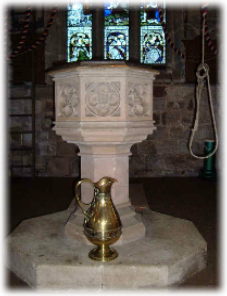
The “new” Font
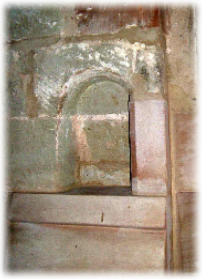
Piscina
The Norman Font
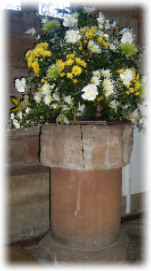
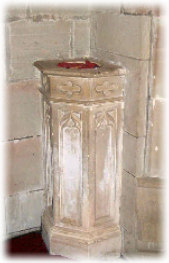
Basin & pedestal
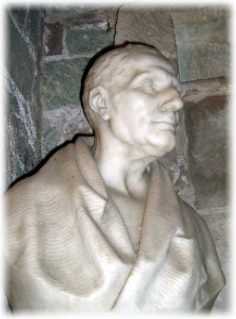
Sir Henry Wakeman

The article below is a full copy which appeared in “The Mirror” magazine in 1846. It is an anonymous account of a visit to Claines Church and makes fascinating comparison with Claines today. The writer has drawn heavily on the Worceser Directory information on Claines, but also makes some personal observations which link them quite closely to the parish.
We believe the writer to be a well known Worcestershire Historian, Mr John Noake, who wrote “The Rambler in Worcestershire” in 1851 and contributed publicly to other Gentlemens Magazines.
Current photographs are shown where there is a reference to a feature still seen today.
It’s a long read, but a fascinating one for anyone who knows, or is interested in the Church!
“Stray notes on a Church in Worcestershire”
Claines in 1846
(So passes away the glory of this world, all things shall pass away, we shall pass away, you will pass away, they will pass away.)
The grave-
"His sledge and hammer he's declined,
His bellows too has lost its wind,
His fire's extinct, his forge decayed,
And in the dust his vice is laid;
His coal is spent, his iron's gone,
His nails are drove, his work is done."
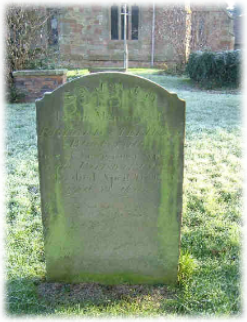
Richard Stephens’ grave today
Claines Parish Stocks-
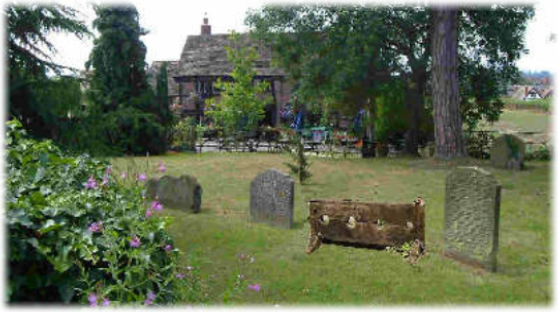
John Porter, now returned inside
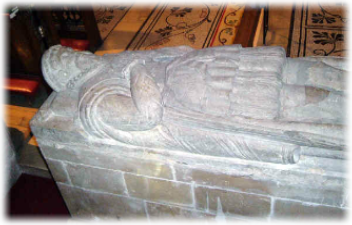
His Epitaph
